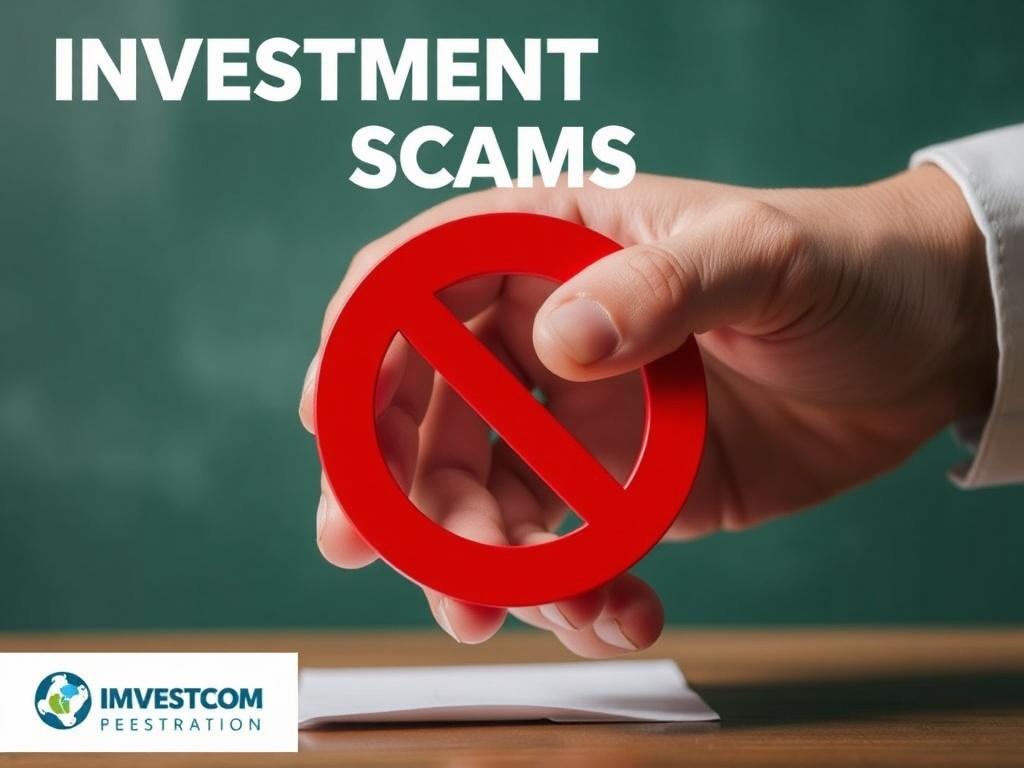SQLITE NOT INSTALLED
Investing your hard-earned money can be a rewarding way to build wealth over time. However, the road to financial success is often littered with pitfalls, missteps, and unfortunately, scams. Understanding how to avoid common investment scams is crucial in today’s fast-paced financial world. Scammers are becoming increasingly sophisticated, using new tactics to lure victims into losing their money. But don’t worry—armed with the right knowledge, you can protect yourself and your finances. In this article, we’ll break down the most common types of investment scams, show you red flags to watch out for, and share practical tips on how to safeguard your investments.
Содержание
What Are Investment Scams and Why Should You Care?

Investment scams are fraudulent schemes designed to deceive investors by promising high returns with little or no risk. These scams can take many forms, from Ponzi schemes and pump-and-dump tactics to fake cryptocurrency projects. The common thread is the scammer’s goal: to steal your money. Why should you care? Because anyone can become a victim, regardless of experience or wealth. Scammers target all kinds of investors — beginners who are just starting out as well as seasoned professionals — by playing on hopes, fears, and sometimes even greed. Understanding how to avoid common investment scams means arming yourself with knowledge that can prevent financial loss and emotional distress.
Common Types of Investment Scams
Before you can learn how to avoid investment scams, it helps to know what they look like. Here’s a breakdown of some of the most prevalent scams:
- Ponzi Schemes: These rely on funds from new investors to pay returns to earlier investors, creating the illusion of profits. Eventually, the whole scheme collapses.
- Pump and Dump: Scammers inflate the price of a low-value stock through misleading statements, then sell it at a profit, leaving others with losses.
- Advance Fee Fraud: Investors are asked to pay fees upfront for supposed lucrative investment opportunities that never materialize.
- Fake Initial Coin Offerings (ICOs): Many scammers use cryptocurrency hype to promote fraudulent ICOs promising high returns.
- Affinity Fraud: These scams exploit trust within a community, such as religious groups, ethnic communities, or professional circles.
Understanding these types gives you a solid foundation to recognize suspicious offers and steer clear of danger.
Recognizing the Warning Signs of Investment Scams
Scammers often use the same psychological tricks to convince their victims. By watching for certain warning signs, you can spot a scam before it’s too late. Here are some common red flags to keep in mind:
Unrealistic Promises
If an investment opportunity guarantees unusually high or consistent returns with little or no risk, be highly skeptical. Every investment carries some risk, and nothing with a “guaranteed” return is truly legitimate.
Pressure to Act Quickly
A classic tactic scammers use is creating a false sense of urgency, saying you must invest “right now” or “before it’s too late.” Legitimate investments give you time to think and conduct due diligence.
Lack of Transparency
If you can’t get clear answers about the investment, where the money goes, or how returns are generated, that’s a major warning. Scammers avoid transparency to cover their tracks.
Unregistered Products or Advisors
Check whether the investment or the person offering it is registered with official regulatory bodies such as the Securities and Exchange Commission (SEC) or the Financial Industry Regulatory Authority (FINRA). Unregistered entities are a huge red flag.
Complex Jargon That Confuses You
While investments can be complicated, scammers often throw around confusing terms to intimidate or overwhelm you, hoping you won’t ask questions.
How to Protect Yourself: Practical Steps to Avoid Investment Scams
Avoiding scams isn’t just about knowing what to look out for; it’s about actively protecting yourself through smart habits and thorough research. Follow these steps to safeguard your investments:
Do Your Homework
Before investing, research the opportunity. Use online databases like the SEC’s EDGAR system to look up filings and check for any disciplinary actions against the company or advisers. Look for independent reviews or news articles about the investment.
Verify Registration
Always check if the investment adviser or firm is registered with regulatory agencies. This information can be found on the SEC or FINRA websites. Registered firms must adhere to regulatory standards, offering a layer of protection.
Ask Questions and Demand Transparency
Don’t shy away from asking tough questions. Legitimate advisers welcome inquiries about fees, risks, and investment strategies. If answers are vague or evasive, consider it a red flag.
Take Your Time
Avoid high-pressure sales pitches that force you to invest immediately. A trustworthy opportunity will stand up to your scrutiny over time.
Be Wary of “Free Money” Offers
If someone offers huge returns with “no risk” or guarantees profits, remember the old adage: if it sounds too good to be true, it probably is.
Keep Your Personal Information Private
Never share sensitive information like bank details or social security numbers lightly. Scammers sometimes use this data for identity theft beyond just stealing investments.
Using Technology to Your Advantage
Technology has made it easier than ever to check the legitimacy of investments and protect yourself against scams.
| Tool | Purpose | Where to Access |
|---|---|---|
| SEC’s EDGAR Database | Look up company filings and reports | https://www.sec.gov/edgar.shtml |
| FINRA BrokerCheck | Verify adviser and firm registrations | https://brokercheck.finra.org/ |
| Better Business Bureau (BBB) | Check company reviews and complaints | https://www.bbb.org/ |
| Consumer Financial Protection Bureau (CFPB) | Report and research financial scams | https://www.consumerfinance.gov/ |
Using these trusted resources regularly can help you make well-informed financial decisions.
Common Myths About Investment Scams Debunked
One reason scams continue to succeed is because of myths and misunderstandings. Let’s clear up some of the most common:
- Myth #1: “I’m too experienced to fall for a scam.”
Experience helps, but even savvy investors can be tricked if they aren’t alert. - Myth #2: “Only big investments get targeted.”
Scammers often go after small investors because they are seen as easy targets. - Myth #3: “If someone has a good reputation, they can’t be a scammer.”
Fraudsters sometimes exploit reputations or pose as reputable advisers. Always verify independently. - Myth #4: “Investment scams are always obvious.”
Many scams are subtle and appear highly professional to gain trust.
Understanding these myths helps keep your guard up and ensures you approach every opportunity with healthy skepticism.
The Role of Emotional Intelligence in Avoiding Scams
Did you know your emotions can make you more susceptible to scams? Scammers often prey on feelings like greed, fear, excitement, or anxiety. Being aware of your emotional state and taking a step back to think logically can save you from poor decisions. Before investing, pause and ask yourself:
- Am I rushing because I feel pressured?
- Am I excited because of unrealistic promises?
- Am I fearful of missing out and thus ignoring red flags?
Slowing down and discussing investment choices with trusted friends or financial advisers can help counteract emotional vulnerability.
How to Report an Investment Scam

If you suspect you’ve encountered an investment scam, reporting it can protect others from falling victim. Here’s how to take action:
Contact Regulators Immediately
Report the scam to agencies such as:
- SEC (Securities and Exchange Commission) – for securities-related fraud
- FINRA (Financial Industry Regulatory Authority) – if a broker or firm is involved
- Federal Trade Commission (FTC) – for general fraud reporting
Notify Your Financial Institution
If you’ve already sent money or shared sensitive details, notify your bank or credit card company immediately to halt transactions or freeze accounts.
File a Police Report
Local law enforcement can sometimes assist or forward the case to specialized federal units.
Spread Awareness
Sharing your experience with friends, family, and community groups can help others avoid similar scams.
Building Long-Term Habits to Avoid Investment Scams

Protecting yourself isn’t a one-time task but a continuous effort. Develop these habits to stay safe:
- Keep Learning: Stay informed about new scams and investment trends.
- Consult Trusted Advisers: Regularly meet with qualified financial professionals.
- Review Investments Regularly: Monitor your portfolio to spot unusual activity early.
- Maintain Healthy Skepticism: Question anything that seems “too good to be true.”
- Network with Other Investors: Sharing insights and warnings can help everyone stay alert.
These steps not only protect your current investments but build the foundation for confident, smart investing in the future.
Conclusion
Avoiding common investment scams may seem daunting, but with the right knowledge and habits, you can significantly reduce your risk. By recognizing warning signs, performing due diligence, using trusted resources, and keeping your emotions in check, you empower yourself to make smarter investment decisions. Remember, scammers rely on haste, secrecy, and unrealistic promises; your best defense is steady skepticism, transparency, and thorough research. Protecting your financial future starts with staying informed and vigilant—because when it comes to your money, caution is not just wise, it’s essential. Keep learning, stay alert, and invest with confidence and care.
Опубликовано: 23 July 2025 Кредитрон – блог о кредитах, финансах и прочих реверансах
Кредитрон – блог о кредитах, финансах и прочих реверансах

